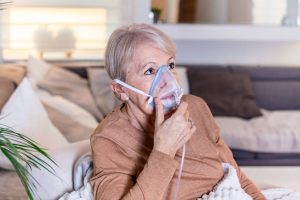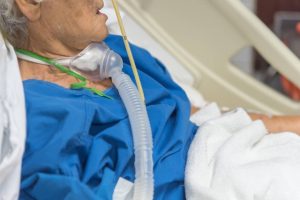With aging, various functions of the human body gradually decline, including the respiratory system. Therefore, many elderly patients require ventilators to assist with breathing. However, some elderly individuals and their families are concerned about potential side effects of using a ventilator.
Side effects of using a ventilator in elderly patients may include:
-
- Initial discomfort: During the initial stages of using a ventilator, some elderly patients may experience discomfort. This is because they need to gradually adapt to the device. However, this discomfort usually resolves within a few weeks.
- Dry mouth: Using a ventilator can cause dryness in the mouth and throat. This occurs because the device directs air to the airway, bypassing the mouth and throat. To alleviate this discomfort, using a humidifier or taking sips of water with a small amount of moisture added can help alleviate dryness.
- Skin irritation: In elderly patients who use a ventilator for extended periods, skin irritation or rashes may occur around the face and nose. This is because the mask applies pressure to the skin and moist skin is more prone to irritation. To minimize this discomfort, regular cleaning of the skin and use of moisturizing creams can help alleviate irritation.
- Infections: If the ventilator mask or tubing is not cleaned and disinfected properly, it can lead to infections. Therefore, regular cleaning and disinfection of the mask and tubing is essential to prevent infections.
- Ventilator dependency: Some elderly patients may develop a dependence on the ventilator and anxiety about breathing without it. However, this dependency usually diminishes over time.

Suggestions to minimize side effects of using a ventilator in elderly patients include:
-
- Education and training: Providing elderly patients with education and training regarding the ventilator is crucial. This can help them understand how to use the device properly and manage any issues that arise. Additionally, education can help alleviate fears and anxiety associated with using a ventilator.
- Comfortable settings: To alleviate discomfort and irritation, gradual reduction in mask pressure on the face and nose can help alleviate irritation and skin damage. Additionally, maintaining appropriate humidity and temperature can also alleviate dry mouth and irritation.
- Correct cleaning and maintenance: Proper cleaning and disinfection of the ventilator mask and tubing are essential to prevent infections. Routine cleaning and maintenance of the ventilator can also extend its lifespan and improve its performance.
- Psychological support: For elderly patients who are concerned about being dependent on the ventilator, psychological support is important. Family members can provide encouragement and support to help them build confidence and overcome their fears.

Conclusion:
Although elderly patients may experience some side effects when using a ventilator, these side effects are usually temporary and can be minimized with appropriate measures. It is essential to ensure that elderly patients receive proper education and training on how to use the ventilator and manage any issues that arise. Additionally, family members should provide support and encouragement to help elderly patients overcome their fears and anxiety associated with using a ventilator. If elderly patients require long-term use of a ventilator, they should receive regular follow-up care from healthcare professionals to monitor their condition.